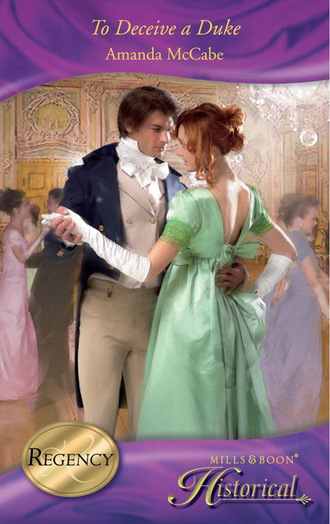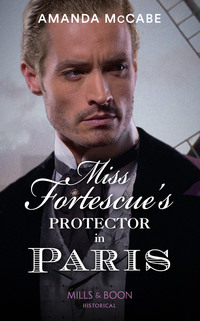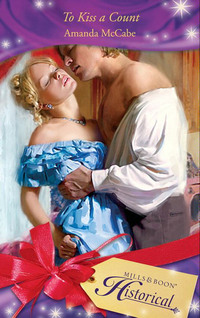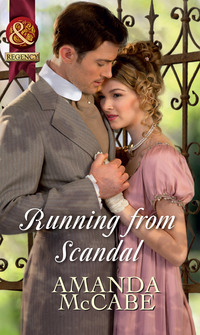
Полная версия
To Deceive a Duke
‘That, too. But as the child is not here yet we shall have to—oh!’
‘What?’
‘I forgot why I came in here in the first place. I am going to call on Lady Riverton, and you promised to come with me.’
Clio felt a sinking in the pit of her stomach at the mention of Lady Riverton. The widow was the self-styled ‘social leader’ of the small band of English travellers in Santa Lucia. People who, like the Chases, were deeply interested in history and antiquities. Everyone else was sensible, and stayed near the cool delights of the shore, the relative culture of Palermo.
Viscount Riverton had possessed a considerable collection himself, especially of Greek coins. His widow, while she claimed to be carrying on his work, seemed to be only really interested in parties, gossip and hats. She had lots and lots of hats. Clio often thought it was a pity she didn’t also have a many-headed Cerberus to guard her door; then it could wear all of them at once.
But Clio had promised Thalia. ‘I’ll have to change my clothes,’ Clio said, gesturing to her garb. She had left off her heavy boots, but still wore her old brown muslin with its dusty hem. Her hair fell down her back in an untidy auburn plait.
‘Just plop on a fancy bonnet!’ Thalia said. ‘She’ll never notice the rest.’ She ‘plopped’ her own hat on to Clio’s head, tugging at the pink ribbons and singing, ‘Oh la la, aren’t the Chase sisters so terribly à la mode!’
Clio laughed helplessly, trying to spin away from her sister. Thalia wouldn’t let go. ‘Brown and pink, Clio, all the rage from Paris! You must be—oh, I say. Where are your spectacles?’
Chapter Six
Lady Riverton’s palazzo was the grandest in town, if not as dramatically situated as the Baroness Picini’s rambling manse. Lady Riverton’s abode had been refurbished before she took possession, freshly stuccoed and painted so that it gleamed a bright, artificial white in the sun. There were no gaps in the tiles of the roof, no overgrown ivy, no slats missing from the shutters, no chips in her garden fountain, which splashed and gurgled as Clio and Thalia turned in through her polished black gates.
‘We won’t stay long,’ Clio said, waiting for their knock to be answered.
‘Of course not,’ Thalia answered, smoothing her pink kid gloves. ‘I don’t think we could take more than an hour without screaming, do you?’
The butler opened the doors, and Clio thought, as she always did when coming to visit Lady Riverton, that it was like stepping back into England. Unlike the Chases’ own rented house, furnished with comfortable, slightly shabby pieces, Lady Riverton had filled her space with dark, gleaming tables and cabinets. Chairs, couches and hassocks upholstered in blue-striped satin, interspersed with displays of her collections: vases, coffers, fragments of statues, cases showing off her husband’s ancient coins.
Lady Riverton herself sat on a throne-like chair and presided over an elaborate tea table, set with silver, porcelain, platters of tiny sandwiches and pink-iced cakes. Her light brown hair, untouched by any hint of grey, was crowned with a dainty lace cap matching the filmy fichu tucked into her pale green muslin gown. A pair of antique cameos dangled from her ears.
Once, in a different life, those earrings had been just the sort of thing to tempt Clio to ‘liberate’ them. But she had made promises, so all she said as she greeted Lady Riverton was, ‘Such charming earrings.’
Lady Riverton trilled a light laugh, reaching up to toy with one of the fragile cameos. ‘A gift from my dear late husband. He had such excellent taste! I am honoured you have decided to grace my tea table this afternoon, Miss Chase, Miss Thalia. We see so little of you lately, you always seem to be trailing around the fields with your father.’
Clio nodded at the other guests, Lady Elliott—whose husband helped her father at the villa site—and her daughters, Mrs Darby and her daughter—who had taken Clio on their impromptu Agrigento tour—as she and Thalia took their seats. Lady Riverton’s friend, her ‘cicisbeo’ as Thalia called him, Ronald Frobisher, was not present, which was most unusual. ‘There is certainly a great deal to see in Sicily,’ Clio said, accepting a cup of tea. ‘Much work to be done.’
Lady Riverton laughed again. ‘Oh, certainly I know all about that! Viscount Riverton was one of the first to see the vast potential of this site. It was just a dusty valley when he came here with Nelson! I’m most gratified to see his work being carried on so admirably. But I also know that young ladies must have their share of amusement. Before I married, I had far too much energy and natural merriment to live by digging alone!’
‘That is so true!’ cried Miss Darby. ‘I am always telling Mama—’
Mrs Darby laid a gentle hand on her daughter’s arm, stilling the excited flow of words. ‘And we are very gratified you provide such—amusements, Lady Riverton.’
‘Not at all. I so vastly enjoy entertaining, and my dear husband always said my parties were so very elegant.’ She gave another little laugh. ‘He was so indulgent. But I do hope you will all be at my next gathering! An evening of amateur theatricals, very diverting. You all received your invitations?’
Clio calmly sipped at her tea, silently willing Thalia not to have an excited outburst à la Miss Darby. Lady Riverton hardly needed any fodder for her ‘Gracious Hostess’ act. ‘Indeed we did, Lady Riverton. We will be most happy to attend.’
‘So kind of you to ask us,’ Thalia said coolly. Clio was proud of her. ‘That is one thing I miss so much about London, the theatre.’
‘As do I, Miss Thalia,’ Lady Riverton answered. ‘We are both cultured souls, I see! While I cannot procure the likes of Mrs Siddons, I fear, I do hope to show off some of our local talent, which I suspect is quite great. The Manning-Smythes have agreed to stage a scene from Romeo and Juliet. So appropriate, is it not, since they are on their honeymoon? And Miss Darby here will do Ophelia’s mad scene. It is so important to include Shakespeare! His more appropriate bits, at least.’
‘Oh, yes,’ Clio said. ‘The Bard is always welcome. But, as this is Sicily, would it not be a fine thing to include some classical playwrights? For is this not where Ovid and Aeschylus worked?’
‘But the Greeks and Romans are so very violent, aren’t they?’ Lady Riverton murmured, her lace cap quivering. ‘So much blood and vengeance!’
Unlike Shakespeare, of course, Clio thought wryly. No blood or vengeance there.
‘But always so vastly exciting,’ Lady Elliott said over her sandwiches. ‘You have been working yourself on some Sophocles, have you not, Miss Thalia?’
‘Indeed,’ Thalia answered. ‘Antigone. The amphitheatre here is so wondrous, with superb acoustics, it just seemed to call out to be brought to life again! To be used for its true purpose. Yet I fear Antigone features no blood at all.’
‘Yes. All the death is offstage, is it not?’ Mrs Darby said. ‘Still, very dramatic.’
‘No blood, you say?’ Lady Riverton said. ‘How interesting. Perhaps, Miss Thalia, you might grace us with a monologue at my little theatricals? Add some appropriate classicism to the proceedings.’
Thalia gave her a gracious smile. ‘If you think your guests would enjoy it, Lady Riverton.’
The purpose of their visit now so neatly achieved, Thalia went on to chat with their hostess about the newest fashions in bonnets—feathers or fruit?—while Clio turned to Mrs Darby. They had become friends on that tour of the ‘valley of the temples’ at Agrigento, but did not see each other as often now that Mr Darby had turned his activities from excavating to writing. A novel, everyone heard, about the original destruction of the old Greek town during the Punic Wars.
‘And how is Mr Darby’s book progressing?’ Clio asked.
Mrs Darby laughed. ‘Well enough, I suppose. He hides himself away in his library after breakfast and does not emerge all day, so something is being worked on.’
‘What do you do yourself, then, while he is scribbling away?’
‘Pay calls, as you see. Go on excursions. I fear it’s becoming rather dull for poor Susan.’ Mrs Darby glanced at her daughter, who was nibbling at a cake with a very dreamy look in her eyes. ‘We have been thinking of hiring a yacht to take us out to some of the other islands. Motya, for the Phoenician sites, perhaps. Maybe you would care to join us?’
Clio thought again of the Duke, of their kiss. Now that he was here, he was not likely to go away again any time soon. It was terribly tempting to run away, to sail off and put the endless blue sea between them! But she could not leave her work. Not just yet. ‘That is very kind of you, Mrs Darby. I have heard such enticing things about the necropolis there. But I am not sure I can leave my family just now.’
‘Yes. We have heard you are hard at work on a more remote site while your father explores that villa of his. It is very brave of you, I must say!’
‘Brave? Not at all. Dull is what most people would call it. The site is just an old ruined farmhouse, but I am enjoying finding clues to everyday life here.’
‘Yet it is so remote! I would fear for Susan out there. And, of course, there is the curse.’
Clio felt a tiny cold shiver along her spine. ‘Curse, Mrs Darby? Is your husband by some chance writing a horrid novel?’
Mrs Darby smiled and shook her head. ‘Oh, Miss Clio. I myself do not believe in such nonsense. I simply happened to overhear your cook gossiping with our housemaid, who I think is her daughter. They didn’t seem to know I speak Italian. They were saying how courageous you are to brave the curse.’
Clio laughed, though she still felt inexplicably cold. As if a goose had walked over her grave. ‘How very amusing. I wonder who placed this curse?’
Mrs Darby shrugged. ‘It seems something terribly violent happened at your farmhouse before it was destroyed. Something that deeply angered the gods. Now it is said that anyone unworthy who dares disturb the ground will be terribly punished. That’s why the site has been so undisturbed all these years.’
‘Perhaps the curse has a time limit,’ Clio suggested, ‘for I am still here.’
‘Or maybe you are considered worthy. Oh, Miss Clio, Sicily is ever fascinating, is it not?’
‘Indeed it is,’ Clio murmured. Well, at least this little tale explained why she had trouble hiring assistants. If only ancient curses could keep Averton away, too.
The drawing room opened amid the quiet buzz of conversation, and the butler announced, ‘The Count di Fabrizzi, my lady.’
Clio’s teacup clattered in its saucer at the sudden announcement. No! Perhaps there were two Fabrizzis in Italy? There simply had to be. She couldn’t take another sudden reappearance, not in one day.
She carefully put the cup and saucer down, schooling her expression into cool lines of casual interest before she looked toward the door.
There were not, after all, two Count Fabrizzis. Only the one she already knew—Marco, who had been one of the Lily Thief’s cohorts, a man deeply concerned with the lost heritage of his homeland. And there he stood, raising Lady Riverton’s lace-mittened hand to his lips for a polite salute as she giggled and blushed.
When she had known him in England, she had been quite aware that he was a titled nobleman from an old Florentine family. Yet he had been disguised as a gypsy, his long black hair tied back with a red bandanna, dressed in plain white shirts and scuffed boots. Now his hair was expertly trimmed into a glossy dark cap that emphasised his chocolate-brown eyes and high Italian cheekbones. He was dressed simply but expensively in a well-cut bottle-green coat, buckskin breeches and a gold-striped silk waistcoat.
Clio folded her hands in her lap, watching the scene warily. She did not feel that lightning shock that went all through her when Averton appeared, that hot fear and excitement. She knew very well Marco would never give away her secrets. But his arrival in Lady Riverton’s drawing room was an unexpected wrinkle in her plans. What was he doing here? What did he hope to gain in Sicily?
If he looked to reincarnate the Lily Thief…
‘Good heavens,’ Mrs Darby murmured. ‘What a beauty.’
Her daughter just giggled, hiding the giddy sound behind her fan.
‘Indeed,’ Clio said, glancing at her sister. Thalia had a frighteningly speculative gleam in her eye. She couldn’t be thinking of recruiting Marco for her play! Could she?
Lady Riverton stood and took Marco’s arm, turning him toward their eager little group. ‘This is the Count di Fabrizzi, who has come all the way from Florence to grace our little society here! He and my dear Lord Riverton were such good friends, you see.’
‘He would never forgive me if I did not pay my deepest respects to his lovely widow,’ Marco said in his liquid accent, giving her a charming smile that made her plump, pretty cheeks turn bright pink. ‘But I fear I will only be in Santa Lucia for a very few days. I have business in Palermo.’
‘Oh, no!’ Lady Riverton cried. ‘Surely your business here cannot be concluded so quickly. And Santa Lucia is so diverting this spring, as I’m sure my friends can tell you. Let me introduce you. Lady Elliott and the Misses Elliott, Mrs Darby and Miss Darby. And the Misses Chase, Clio and Thalia, whom you must have heard of. They are the famous Chase Muses. Ladies, you must join me in urging the Count to stay a little longer.’
‘Oh, yes!’ Lady Elliott declared. ‘If you were a friend of Lord Riverton, you must enjoy antiquities. There are so many around here.’
Lady Riverton urged Marco to sit down in the chair next to hers, pressing a cup of tea and some sandwiches on him. ‘Yes, quite,’ he answered. ‘Ancient history is one of the great passions of my life.’
Miss Darby giggled again behind that fan, until her mother shot her a stern glance.
‘Then you should stay and meet our husbands,’ Lady Elliott went on. ‘As well as Mr Frobisher and the Manning-Smythes. Most of them are working on the site of an ancient Greek town, and have already found many exquisite objects. We expect more great things. I’m sure they would welcome your expertise.’
‘Welcome the free labour,’ Thalia muttered to Clio.
‘You must at least stay for my theatrical evening,’ Lady Riverton said.
‘It sounds most—diverting,’ Marco answered. He gave their hostess another smile, displaying a deep-set dimple in his olive-complected cheek that made even Mrs Darby sigh.
‘You enjoy the theatre, Count?’ Thalia said.
‘When I have the chance to attend,’ Marco answered. He turned his smile on to Thalia, but it turned to a frown of puzzlement when he met her frank, speculative blue eyes.
Well, Clio thought, she could not save Marco if Thalia had decided he would act in her play. Anyone caught in Thalia’s crosshairs was doomed. But she still could not decipher what he was doing here. Marco and the Duke in one place? So strange.
The conversation went along most politely, turning to the social events of Santa Lucia, the objets that had been found thus far in the Greek town. Clio sipped at a fresh cup of tea, studying Marco over the painted china rim. They exchanged only one meaningful glance, a long look that promised much conversation later, but other than that he gave no sign at all that he had ever seen her before. Perhaps Thalia was right about his potential acting skills.
And Clio had to keep up her own, too. Luckily, deception had become second nature to her in her Lily Thief days. But this afternoon, smiling and chatting as if she hadn’t a care, she felt as if a bar of cold iron was pressing down on her. Making her want to scream.
Her cheeks hurt from all that smiling, too.
At last, the half-hour deemed polite for a social call passed, giving Clio and Thalia the excuse they needed to escape. As they collected their shawls and gloves and thanked Lady Riverton, the footman appeared again with a note on a silver tray. Lady Riverton scanned it quickly, and suddenly broke into a triumphant laugh.
Curious, Clio paused in drawing on her gloves. Surely there was little in Santa Lucia correspondence that could be that exciting. Not very much changed here from day to day. Until now.
‘Oh, Count di Fabrizzi, now you really must come to my theatricals!’ Lady Riverton said, carefully refolding the note. ‘It would be quite the triumph to have in attendance both an Italian count and an English duke. Two handsome young noblemen to grace my drawing room!’
‘A duke?’ exclaimed Lady Elliott. ‘I was not aware there were any such personages in the neighborhood.’
‘There is now. He has just accepted my invitation, which I sent round as soon as I heard who had taken the Picini palazzo.’ Lady Riverton gave them a supremely satisfied smile. ‘And you will never guess who it is.’
‘Devonshire!’ guessed Miss Darby.
‘Clarence,’ suggested Thalia. ‘Oh, no. He would be too fat to get up the hill.’
‘Better,’ Lady Riverton said. ‘It is the Duke of Averton. So handsome and delightful! And he will actually be here for my theatrical evening. Won’t it be glorious?’
Thalia glanced at Clio, her eyes wide. ‘But how could…?’
Clio grabbed her hand, holding it tightly. ‘Glorious, indeed. We do look forward to it, Lady Riverton, but now we really must go before our father misses us. It was lovely to make your acquaintance, Count di Fabrizzi.’
‘Oh, no, Miss Chase,’ Marco said, giving her an elaborate bow. Only the merest shadow in his dark eyes reflected a certain dismay at the mention of the name ‘Averton’. He, too, remembered the Yorkshire dungeon. ‘The pleasure was entirely mine.’
Clio left Lady Riverton’s house, still holding on to Thalia’s hand until they were at a safe distance on the street. When she let go, it was like releasing a tidal wave.
‘Averton!’ Thalia exploded. ‘What is he doing here? How dare he show his face where we are, how dare he come as near us as—as Rome! Handsome he may be, but he is naught but a freebooter, a—’
‘A freebooter?’ Clio said, laughing despite herself. ‘Thalia, he is hardly Drake on the Golden Hind.’
‘No, he is worse. I would wager he only comes here to steal whatever Father finds in his villa. And to harass you some more.’
‘And don’t forget, to attend Lady Riverton’s party. He has definitely come for that.’ Clio spoke with a lightness she was far from feeling, hurrying her steps towards home. She longed for the quiet of her own room. The safe haven she had always found in Santa Lucia felt torn now, reshaped with the arrivals of Averton and Marco. Something was definitely afoot, something she could not see or understand. Not yet, anyway. ‘Danger,’ the Duke had said. How right he was.
Thalia hurried after her. ‘Well, then, I won’t go to that party. I have no wish to see that spoiled, arrogant—’
‘Freebooter? Oh, Thalia, we have to go. We told Lady Riverton we would, and you were looking forward to it. Everyone will need your wonderful Antigone to save them from drowning in sugary faux-Shakespeareness. There will be lots of people there, we won’t even notice Averton. Handsome or not.’
‘Perhaps not,’ Thalia said reluctantly. She was silent for a moment, then added, ‘But we will be sure to notice Count Adonis! And he will notice you.’
Clio was careful not to look at her sister, just walking a bit faster on their way home. ‘Don’t be silly. Why would a gorgeous Italian count notice me, when your golden beauty or Miss Darby’s conspicuous giggles will be near?’
‘He kept looking at you just now,’ Thalia said. Not for the first time, Clio cursed Thalia’s powers of observation. ‘If I was a reader of horrid novels, like our friend Lotty, I would call them “speaking glances”.’
‘You are just imagining things. I think all the theatricality is getting to you.’
‘I think not.’ Thalia opened their own garden gate, and went prancing up to the front door, chanting, ‘Clio has a new admirer!’
‘What?’ cried Cory, who came into the foyer just in time to hear this bit of news. ‘Clio has an admirer? Who is it? Oh! Not that silly Peter Elliott? I thought he was in love with you, Thalia.’
‘Far better,’ Thalia said. ‘A dark Italian count! He kept staring at her over Lady Riverton’s tea table. And he is beautiful.’
‘Perhaps Clio will soon be a contessa!’ Cory said, pretending to swoon. ‘And we will all live with her in Italy for ever. In her grand palazzo, with her hundreds of servants and vast marble halls.’
Clio fled their merry laughter, taking the stairs two at a time until she could slam her chamber door behind her and be alone, in silence, at last. Heaven deliver her from sisters!
And from English Viking dukes and ‘dark Italian counts’. They all knew far too many of her secrets already.
Конец ознакомительного фрагмента.
Текст предоставлен ООО «ЛитРес».
Прочитайте эту книгу целиком, купив полную легальную версию на ЛитРес.
Безопасно оплатить книгу можно банковской картой Visa, MasterCard, Maestro, со счета мобильного телефона, с платежного терминала, в салоне МТС или Связной, через PayPal, WebMoney, Яндекс.Деньги, QIWI Кошелек, бонусными картами или другим удобным Вам способом.









